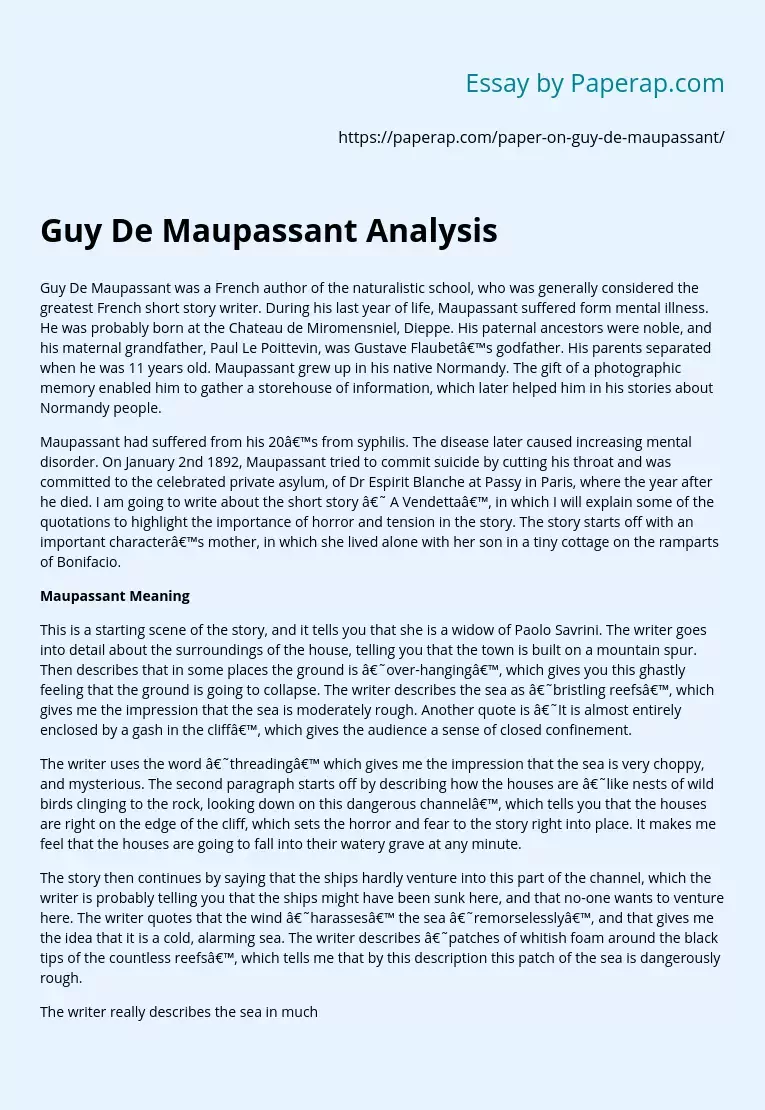Guy De Maupassant Analysis
Guy De Maupassant was a French author of the naturalistic school, who was generally considered the greatest French short story writer. During his last year of life, Maupassant suffered form mental illness. He was probably born at the Chateau de Miromensniel, Dieppe. His paternal ancestors were noble, and his maternal grandfather, Paul Le Poittevin, was Gustave Flaubet’s godfather. His parents separated when he was 11 years old. Maupassant grew up in his native Normandy. The gift of a photographic memory enabled him to gather a storehouse of information, which later helped him in his stories about Normandy people.
Maupassant had suffered from his 20’s from syphilis. The disease later caused increasing mental disorder. On January 2nd 1892, Maupassant tried to commit suicide by cutting his throat and was committed to the celebrated private asylum, of Dr Espirit Blanche at Passy in Paris, where the year after he died. I am going to write about the short story ‘ A Vendetta’, in which I will explain some of the quotations to highlight the importance of horror and tension in the story.
The story starts off with an important character’s mother, in which she lived alone with her son in a tiny cottage on the ramparts of Bonifacio.
Maupassant Meaning
This is a starting scene of the story, and it tells you that she is a widow of Paolo Savrini. The writer goes into detail about the surroundings of the house, telling you that the town is built on a mountain spur. Then describes that in some places the ground is ‘over-hanging’, which gives you this ghastly feeling that the ground is going to collapse.
The writer describes the sea as ‘bristling reefs’, which gives me the impression that the sea is moderately rough. Another quote is ‘It is almost entirely enclosed by a gash in the cliff’, which gives the audience a sense of closed confinement.
The writer uses the word ‘threading’ which gives me the impression that the sea is very choppy, and mysterious. The second paragraph starts off by describing how the houses are ‘like nests of wild birds clinging to the rock, looking down on this dangerous channel’, which tells you that the houses are right on the edge of the cliff, which sets the horror and fear to the story right into place. It makes me feel that the houses are going to fall into their watery grave at any minute.
The story then continues by saying that the ships hardly venture into this part of the channel, which the writer is probably telling you that the ships might have been sunk here, and that no-one wants to venture here. The writer quotes that the wind ‘harasses’ the sea ‘remorselessly’, and that gives me the idea that it is a cold, alarming sea. The writer describes ‘patches of whitish foam around the black tips of the countless reefs’, which tells me that by this description this patch of the sea is dangerously rough.
The writer really describes the sea in much detail, and there is probably a reason for this. The story goes on and the writer really describes the sea a big part of the horror, tension and suspense in the story. The story changes as it stops describing the sea, and gets on with the rest of the story, by explaining the characters. The old woman in the story is a widow, and that her house is clinging to the edge of the cliff. This immediately gives me a sense of sadness for the old woman, as she has lost her loved one.
I think that the old woman will have a big part in the story, as it is her house that the writer describes at the start of the story. The writer then introduces two other characters: her son, Antoine, and their dog Frisky. The dog is described as a ‘raw-boned bitch’, which tells me that the dog hardy eats anything and that you can see the dog’s bones due to this. This also makes me think that the family is quite poor, as the dog is not well fed. he next part tells the audience that the dog is a sheep dog, used by Antoine as a ‘gun-dog’, which adds more tension and horror to the story, because a gun dog is used to hunt, and that means to kill an animal, so killing adds more tension and horror to the story. The story then changes from telling the audience about the characters, to actually carrying on with the story. The writer tells us that the old widows son, Antonie, was ‘treacherously’, knifed and murdered. The writer doesn’t go into much detail about what happened, and doesn’t go into much detail.
The meaning of treacherously is deceitful and double-crossing, which means that Antoine might have double-crossed someone in order for him to be killed. The story carries on and says that a man called Nicolas Ravolati knifed him, and then escaped to Sardinia the same night. Sardinia is a boat away from Bonifacio, which meant that it was a quick and easy get away for him. I think that when it came to revenge, the widow wanted revenge instead of grieving, as she is described as ‘motionless’ when the body came to her door. I think that she bottled her emotions up inside, as she refused to let anyone but her dog sty with her.
Guy De Maupassant Analysis. (2019, Dec 05). Retrieved from https://paperap.com/paper-on-guy-de-maupassant/

